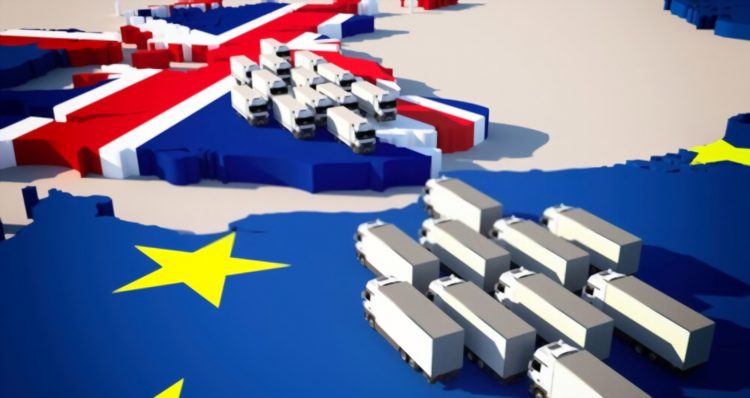What is the reason for the increase in trade costs between the UK and the EU after the Brexit?
What problems has the increase in border inspections between the UK and the EU created for British passengers and truckers?
What are the customs regulations between the UK and the EU after the Brexit?
What do the British polls say about the Brexit results?
The latest report from a committee in the UK Parliament shows that the Brexit agreement and the resulting border inspections have damaged trade with the EU, and the situation will worsen in the coming months.
Rising transaction costs between the UK and the EU
Border inspections at the UK-EU border have increased trade costs and suppressed trade. Experts warn that the situation is likely to get worse. A member of the UK Parliament said that the Brexit laws have damaged UK’s trade with the EU and that the problem may worsen unless the UK government cooperates with Brussels to reduce restrictions on British ports.
Border inspections increase transaction costs.
Just hours after the appointment of Jacob Rees-Mogg as minister for Brexit opportunities, a report by the cross-party Public Accounts Committee (PAC) holds the government accountable for how it spends budget and public resources. The committee announced that the situation would worsen from September. When the EU enforces stricter regulations, global trade is expected to increase traffic through British ports as the epidemic improves. The committee’s chairman, Dame Meg Hillier, urged ministers to upgrade port systems and infrastructure, saying the committee. One of the great promises of Brexit was freeing British businesses to give them the headroom to maximize their productivity and contribution to the economy – even more desperately needed now on the long road to recovery from the pandemic.”
Increased border inspections and problems for truckers
The warning from the cross-party PAC came after a transport industry executive said truck drivers might become accustomed to queuing for hours at key ports on busy days. Queues of several kilometres at the entrances to major British commercial ports in the first weeks of 2022 are a scene that is now regularly seen in the country. Rod McKenzie, RHA managing director of policy and public affairs, said the new regulation “mean friction where none existed”.
Disruption in the transport and movement of British passengers
Under a Brexit agreement finalized by UK Prime Minister Boris Johnson in December 2020, the EU took full control of imports in January 2022 after a one-year transition period. The UK government had intended to do the same last year but has postponed it three times, and according to the cross-party Public Accounts Committee, UK government officials can’t give full assurance that it will not do so again. Reports suggest that the UK should upgrade port equipment and border inspections by September 2022 to prevent passenger and transport operations disruption. Despite the increase in queue times, the RHA believes the freight situation post-Brexit is not as disastrous as expected. “A negative situation picture would be if the borders were not working and there was chaos,” McKenzie added. “What we have got is friction because there’s a check, but it’s not disastrous.”
Enforce customs regulations between the UK and the EU
From the beginning of last year, the customs regulations that were formulated after the withdrawal of the UK from the EU were fully implemented, and this issue caused a severe disruption of the business and travel of the British. Under the UK agreement with the EU from the beginning of January 2021, border controls between the EU and the UK were fully implemented and, as expected, with the extension of the queue of trucks and trailers at the border, trade and the supply of raw materials needed by several Jobs in this country will be disrupted.
Customs regulations are more complex than at the beginning of 2022
According to the Federation of Small Businesses (FSB), since the beginning of 2022, imports from the EU have become more difficult. They require more administrative work, and the regulations required by the UK government have complicated the situation. According to media reports in the UK from the beginning of January, companies have to precisely record the details of imported goods so as not to be delayed in border inspections. Still, many companies are not ready for this process. Also, imports and exports for items such as animal feed require the completion of numerous questionnaires and more bureaucracy to reduce the payment of tariffs or customs duties.
The British are dissatisfied with the results.
The latest polls in the UK show that with the emergence of problems due to Brexit and the failure of the promises of supporters of British secession from the EU, most people now want to return to the status quo ante and rejoin the EU. Brexit has also increased divergence in the UK and intensified pro-independence tendencies. Scotland, with most of its inhabitants remaining in the EU, voted in favour of holding a referendum on British independence and seriously pursuing its implementation.
The British took part in a referendum on June 23, 2016, on the country’s continued membership of the EU, in which 17.4 million people (51.9% of voters) left, and 16.1 million people (48.1%) voted to stay. Following the agreement with the EU, at 23:00 on January 31 2020, the UK withdrew from the EU common market and customs, ending its 47-year membership in the EU. With the advent of the UK’s secession from the EU, a series of problems arose in the country, including the shortage and high cost of some goods, services, and labour and the creation of barriers on both sides to easy trade.




























